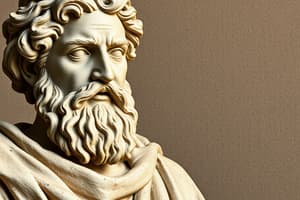Podcast
Questions and Answers
What does Aristotle refer to politics as?
What does Aristotle refer to politics as?
the master science
What are the key aspects people disagree about in politics?
What are the key aspects people disagree about in politics?
- How resources should be distributed
- Who has the most influence
- Whether cooperation or conflict should be the basis of society
- All of the above (correct)
Politics is considered a solitary activity.
Politics is considered a solitary activity.
False (B)
What does the existence of rival opinions lead to in politics?
What does the existence of rival opinions lead to in politics?
According to Hannah Arendt, what does political power involve?
According to Hannah Arendt, what does political power involve?
Politics is the activity through which people make, preserve, and amend the general rules under which they _____
Politics is the activity through which people make, preserve, and amend the general rules under which they _____
What two major problems must be addressed when clarifying the meaning of 'politics'?
What two major problems must be addressed when clarifying the meaning of 'politics'?
What is the relationship between politics and international relations described as?
What is the relationship between politics and international relations described as?
Study Notes
Understanding Politics
- Politics is driven by human disagreement about lifestyles, resource distribution, power, and societal cooperation versus conflict.
- Aristotle considers politics the “master science,” essential for improving lives and creating a Good Society.
- Politics is inherently social, requiring dialogue between individuals, highlighted by the necessity of collective actors to engage in political discourse.
Nature of Political Disagreement
- Disagreement extends to definitions of what makes interactions political, influenced by location (government or public sphere) and types of activity (conflict resolution versus control).
- Varied interpretations lead to diverse theoretical approaches and analytical schools within the study of politics.
Politics as an Academic Discipline
- Politics is linked to the activities of making, preserving, and amending the rules governing society.
- The study of politics (capitalized as ‘Politics’) delves into the intricate relationship between conflict and cooperation among individuals and groups.
Conflict and Cooperation
- Rival opinions, competing needs, and differing interests contribute to political disagreement.
- Collaboration is essential for individuals wishing to influence or adhere to societal rules; political power is about “acting in concert” (Hannah Arendt).
- Politics primarily involves conflict resolution, though it often remains an ongoing process rather than a definitive outcome.
Challenges in Defining Politics
- The term ‘politics’ carries numerous connotations in everyday use, making it a complex and “loaded” term.
- Context plays a significant role in shaping the meaning of politics and understanding its implications in social interactions and governance.
Influence of Globalization
- Globalizing trends blur the lines between politics and international relations, raising questions about the relevance of traditional disciplinary boundaries in political study.
Key Questions in Political Study
- What are the features that define politics and political activity?
- How have various thinkers and traditions interpreted the concept of politics?
- What methods and schools of thought dominate the academic study of politics?
- Is political study scientifically viable?
- What role do concepts, models, and theories play in political analysis?
- How have global trends altered the dynamics between politics and international relations?
Studying That Suits You
Use AI to generate personalized quizzes and flashcards to suit your learning preferences.
Related Documents
Description
Explore the fundamental concepts of politics in this quiz based on Chapter 1 of Aristotle's Politics. Discover why disagreement is central to political discourse and how it influences resource distribution and collective decision-making. Engage with the idea that humans are inherently political beings.



